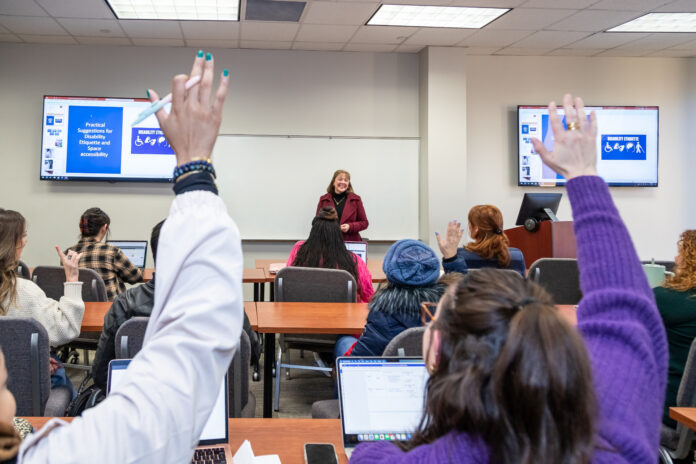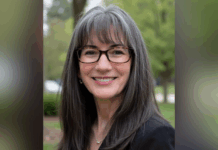
A major federal grant is helping Mercer University students fill a much-needed role in the counseling profession.
Since 2015, the University has received more than $2.1 million from the U.S. Department of Education Rehabilitation Services Administration to fund scholarships for students pursuing a master’s degree in clinical rehabilitation counseling. To date, 82 students have received the scholarship, said Dr. Suneetha Manyam, professor of counseling and grant assessment coordinator in the College of Professional Advancement.
“The reason why this grant started from the Department of Education was because there are a lot of shortages at the state offices of certified rehabilitation counselors at the master’s level,” she said. “So, to boost those numbers and also to help serve the rehabilitation population, the Department of Education decided to encourage the master’s degree training at the University.”
Clinical rehabilitation counseling is a specialty that focuses on helping people with physical, mental or emotional disabilities gain employment and become self-sufficient. This type of counseling takes a holistic view of mental health, taking into consideration a disability’s impact on a person’s job, quality of life and social connections, said Dr. Kristina Henderson, associate professor of counseling and program coordinator for the Master of Science in clinical rehabilitation counseling.
“The ultimate goal is helping folks with disabilities just live as full a life as they can, and that means employment and recreation and relationships,” she said.
One in four adults living in the U.S. has some type of disability, according to the Centers for Disease Control and Prevention. Additionally, one in five U.S. adults experiences mental illness each year, according to the National Alliance on Mental Illness. And yet, the National Council for Mental Wellbeing reports that 77% of U.S. counties are experiencing a severe shortage of mental health providers.
“There are just not enough people to serve folks with disabilities,” Dr. Henderson said.
The Rehabilitation Services Administration grant provides scholarships of up to 100% tuition for up to nine credit hours for three semesters of enrollment in Mercer’s Master of Science in clinical rehabilitation counseling program. In return, scholars commit to working for a state vocational rehabilitation agency or disability-related organization for two years for each academic year of funding received.
“We’ve got people who work at the Georgia Vocational Rehabilitation Agency. We’ve got people that work for the Department of Veterans Affairs,” Dr. Henderson said. “We’ve had people work in correctional facilities because that is another place where folks with disabilities are underserved. We have people at community service boards, which are the public mental health providers.”
Janice Barrocas, a recipient of a Rehabilitation Services Administration scholarship, graduated with her master’s in clinical rehabilitation counseling in 2020. After graduation, she worked as a certified rehabilitation counselor at the Georgia Vocational Rehabilitation Agency in Tucker before opening a private practice in 2022 in DeKalb County.
Barrocas, who also is a licensed professional counselor, helps her clients cope with vision loss. She is a founding member of the Task Force Empowering Blind Independence.
“Adjusting to vision loss is a non-bereavement loss. Nobody died,” she said. “In society, we have a lot of traditions around how to support each other emotionally when someone passes. When someone becomes permanently and significantly disabled, people don’t know what to do with that, and socially, we haven’t been taught.”
A person adjusting to vision loss goes through specific stages emotionally, similar to the stages of grief, she said. These include physical and social trauma, shock, denial, mourning and withdrawal, depression, and, eventually, learning new coping skills. These stages culminate in self-acceptance and self-esteem as a visually impaired person.
“But a lot of the way you recover, a lot of the way a person develops a new identity as a confident visually impaired person, is learning new skills,” she said. “You learn nonvisual ways of doing things, getting technology to talk to you, learning white cane navigation skills and how to access resources. All these are things a sighted person takes for granted when they come into counseling.”
Barrocas helps clients accept their disability and connect with resources, meeting them where they are — figuratively and sometimes literally. Initial client discussions include questions about their vision and how they access print.
Accessibility is a clinical issue. Many people seeking adjustment counseling are new to having low vision or blindness. Barrocas asks clients about the best way to communicate and complete paperwork as part of her counseling intake process.
“Are you a texter? If I leave you a voicemail, will you know that you’ve received it? A visually impaired client won’t necessarily be able to see a visual icon on their flat screen phone. I ask, ‘If I send you documents to sign electronically, will that work for you?’” she said.
Barrocas assures clients she will accommodate their disability and provide needed support to complete intake paperwork. If a client cannot access print and has no sighted assistance available to complete necessary forms, Barrocas will travel to the client.
“I offer to bring hard copies of consent forms out to you and carry a signature guide,” she said. “I will read every word of these forms to you aloud and put a pen in your hand and help you find the right places to sign it if you like.”
Moses Little, another recipient of a Rehabilitation Services Administration scholarship, also works with clients who are blind or have low vision. He graduated with his master’s in clinical rehabilitation counseling in 2021 and now works as a certified rehabilitation counselor at the Georgia Vocational Rehabilitation Agency in Athens. He also serves on the governor-appointed State Rehabilitation Council.
“What I do as a counselor is I determine what that visual disability is and then cater their plan to them. Each and every client is different. Working with the blind and low-vision community is special because you learn so much about their viewpoint and how life looks to them on a regular basis,” he said.
He offers clients specialized training and helps them receive various accommodations from employers, such as using a screen magnifier or screen reader that can help those who are blind or have low vision use a computer.
Little said he’s always felt a calling to become a counselor, and helping others through difficult times to reclaim their independence is meaningful.
“From what I’ve been told, the number one feared disability for many people is losing their vision, and so being able to assist in that transition is very important to me, and I appreciate them giving me the opportunity to help,” he said.
This story originally appeared in the Spring 2025 issue of The Mercerian. Read the full magazine here.









